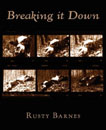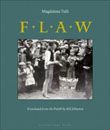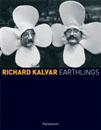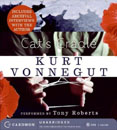Book Digest: November 19, 2007
From Joseph O’Connor’s yet-unheralded new opus, Redemption Falls, as his protagonist is escaping exile in Tasmania:
not freedom at allancien regime
Breaking It Down by Rusty Barnes

Rusty Barnes edits the journal Night Train, one of those sparkling stars that complete the literary constellation. He has a new book of “flash fiction” (a genre that has escaped me, but which amounts to very, very short stories) published by Sunnyoutside. Other small literary journal people like Ploughshares founder Dewitt Henry say nice things about him. The small booklet format reminds me of Clear Cut Press publications—which is a good reference point.
» Read an excerpt from Breaking It Down
Ex Mex: From Migrants to Immigrants by Jorge G. Castañeda

Former journalist and Mexican foreign-minister-turned-scholar Castañeda is also the author of Utopia Unarmed and a serviceable biography of Ernesto Guevera. Here he takes on the quagmire of U.S.-Mexican immigration issues, including a behind-the-scenes account of the 2001-2002 offline negotiations between Mexico and the United States regarding Mexican migrants.
» Listen to an interview with Jorge G. Castañeda
The Elephant, the Tiger, and the Cell Phone by Shashi Tharoor

The world has spent billions propping up Musharraf in Pakistan; with all the current focus on that region, it would serve us well to understand the amazing transformation of its neighbor, India, from a backward, third-world giant to thriving, full-tilt modernity. The world’s second-largest nation, India claims a middle class of 300 million—if that number rings a bell, it’s because it’s the population of the entire U.S. It stands to reason we should know more about India than that it is a leading host country of call centers. (Hold the jokes.)
» Watch an interview with Shashi Tharoor
Flaw by Magdalena Tulli, translated by Bill Johnston

Though I have accepted softcover books as a useful literary appliance, I have never really overcome certain pathological reservations—having said that, I must offer that Archipelago does a fine job of putting out subtly attractive editions. In this case, it has published three of Polish novelist Tulli’s four award-winning novels. Tulli, spoken of as a latter-day Bruno Schulz, writes of an unnamed city devastated by an economic collapse and an influx of refugees. The novel’s prose becomes less and less specific and more of a meditation on story.
» Read an excerpt from Flaw
Earthlings by Richard Kalvar

It used to be that membership in Magnum, the photographer’s cooperative agency that Henry Cartier Bresson, Robert Capa, and David “Chim” Seymour founded after World War II, was a platinum-plated certificate of validation. It still may be, though it’s hard to get a fix on where photojournalism is today. Kalvar, a Magnum shooter for 30 years, gives us his first monograph, assembled from years of global peregrinations—hopefully there will be more to come.
» View images from Earthlings
The Cultural Contradictions of Democracy: Political Thought Since September 11 by John Brenkman

As the ongoing debacle of the Iraqi intervention evinces, the grand ideas that emerge in American political discourse have given rise to a host of contradictions and anomalies. Brenkman, a CUNY English professor specializing in culture and political theory, assesses the rhetoric of neocons like Robert Kagan and Paul Berman, as well as lefties like Noam Chomsky and Jürgen Habermas in this book. He concludes that political thought and conversation have become corrupted, in no small part stemming from the dialectical visions of Thomas Hobbes, Immanuel Kant, Max Weber, Hannah Arendt, and Isaiah Berlin.
» Read an excerpt from The Cultural Contradictions of Democracy
Soaring With Fidel: An Osprey Odyssey From Cape Cod to Cuba and Beyond by David Gessner

OK, so I’m susceptible to any book with even the faintest reference to Cuba and things Cuban. Anyway, Gessner, who lives on Cape Cod and is fascinated by ospreys, decided in 2004 to follow the annual 7,000-mile migration of these big birds—which have wingspans of six feet—from the Eastern U.S., over Cuba, and into Venezuela. Gessner uses all manner and modes of transport and, naturally, meets a splendid cast of likeminded types. So we have an adventure story and something of a parable about following your dreams. By the way, Gessner named his favorite osprey Fidel.
» Read an excerpt from Soaring With Fidel
Cat’s Cradle by Kurt Vonnegut, read by Tony Roberts

It’s hard to believe that Cat’s Cradle was published more than 40 years ago—but that’s my difficulty, not yours—and given its persistent appearance on high-school reading lists, it may well be the most frequently read of Vonnegut’s novels. The narrator is a writer who, in this case, is working on a book called The Day the World Ended, about the bombing of Hiroshima—much grist for Vonnegut’s lampooning mill. For those of us who have read this classic, the unabridged reading by actor Tony Roberts is an attractive iteration of Vonnegut’s modern classic.
» Listen to an excerpt from Cat’s Cradle
Black Mass: Apocalyptic Religion and the End of Utopia by John Gray

A number of American authors, most notably Chris Hedges (American Fascists: The Christian Right and the War On America), have written poignantly on the scourge and threat of right-wing religious zealotry. Eminent British philosopher Gray takes a more elevated perspective, and links the history of utopianism—which he surveys from the Reformation to the French Revolution to the post-Cold War world—to the present political objective reality. And most disturbing is the emergence of a belief in one and only one construct of political behavior. Frightening stuff to consider.
» Read an excerpt from Black Mass
Capote in Kansas: A Ghost Story by Kim Powers

There was Truman Capote’s In Cold Blood. There was Harper Lee’s To Kill a Mockingbird. There was the film Capote. And now Kim Powers (The History of Swimming) has conjured a narrative that resolves some and speculates on other features of the Capote/Lee friendship and some of the odd directions it took. Powers also gives voice to the murdered family of whom Capote wrote. It’s an odd hybrid tale, made compelling by the two offbeat protagonists and the surreal crime story in which they were to become embroiled.
» Read an excerpt from Capote in Kansas
The Discovery of France: A Historical Geography, From the Revolution to the First World War by Graham Robb

Despite the fact that this book has been widely praised, it strikes me that its singular achievement is to offer a refreshed view of France, much to the disregard of the conventional wisdom and regnant folk beliefs. Robb, who is a well-regarded biographer of Balzac, Hugo, and Rimbaud, makes a thoughtful leap of conception and imagination to form a clear picture of how modern France was formed, convincingly arguing how unknown and unfamiliar France is, even in the present day.
The Art of William Steig by Robert Cottingham, Edward Soral, Jeanne Steig, and Maggie Steig

If you have even a passing acquaintance with The New Yorker, William Steig’s drawings, regularly in evidence in the magazine for over 70 years, most certainly caught your eye—he did more than 170 covers and 1,600 illustrations. Steig was also a children’s book writer and illustrator—producing Shrek (the movie of which, no doubt, exponentially widened his name recognition) and Sylvester and the Magic Pebble, among others. This book contains nearly 300 of his drawings, with useful background information assembled by Claudia J. Nahson that complemented a recent exhibition at New York’s Jewish Museum.
» View images from The Art of William Steig
The Next Rodeo: New and Selected Essays by William Kittredge

Good luck getting anyone east of Philadelphia to pay attention to Kittredge’s meditations on western landscapes and various environmental crises. Considering that he grew up on his family’s cattle ranch in eastern Oregon and taught at the University of Montana for nearly 30 years, he does have first-hand knowledge of the ongoing depletion of the West’s natural resources. As he puts it: “I’ve learned to think of myself as having had the luck to grow up at the tail end of a way of existing in which people lived in everyday proximity to animals on territory they knew more precisely than the patterns in the palms of their hands.”
